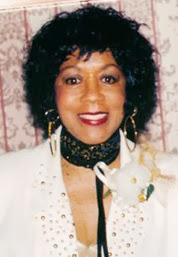Dear Julia,
 As you and Nathan know, I adopted you both some years ago as my aunt and uncle, since all of my elders have transitioned to ancestor hood, leaving me as the one of the two oldest among my many cousins, my brother Ollie is one year older than I am. It is with the the deepest love that I sing this song to you, wishing you well for a job well done. Looking at you yesterday as you reposed in your sick bed, hugging you and kissing your sweet lips was one of the most joyful moments in my life. I was so happy you recognized me. As I told you, I had mentioned your name the night before on KPOO radio during my interview with our revolutionary comrade Terry Collins. One of my students read my Parable of the Bitter Bitch which opens with a reference to your book The Sexual and Political Anorexia of the Black Woman. Thank you, Julia, for all the work you and Nathan did for the North American African Nation. Thank you for teaching us how to love as you have demonstrated with your 57 years of marriage. Thank you for that wonderful performance you did on Tavis Smiley's Forum on the State of Black America. Thank you for those piano concerts you gave me at your house and thanks for being the loving wife of Dr. Nathan Hare. As a London newspaper said, you are the female Malcolm X. Just know that I love you madly and will see you next week as promised.
As you and Nathan know, I adopted you both some years ago as my aunt and uncle, since all of my elders have transitioned to ancestor hood, leaving me as the one of the two oldest among my many cousins, my brother Ollie is one year older than I am. It is with the the deepest love that I sing this song to you, wishing you well for a job well done. Looking at you yesterday as you reposed in your sick bed, hugging you and kissing your sweet lips was one of the most joyful moments in my life. I was so happy you recognized me. As I told you, I had mentioned your name the night before on KPOO radio during my interview with our revolutionary comrade Terry Collins. One of my students read my Parable of the Bitter Bitch which opens with a reference to your book The Sexual and Political Anorexia of the Black Woman. Thank you, Julia, for all the work you and Nathan did for the North American African Nation. Thank you for teaching us how to love as you have demonstrated with your 57 years of marriage. Thank you for that wonderful performance you did on Tavis Smiley's Forum on the State of Black America. Thank you for those piano concerts you gave me at your house and thanks for being the loving wife of Dr. Nathan Hare. As a London newspaper said, you are the female Malcolm X. Just know that I love you madly and will see you next week as promised.Love Eternally,
Marvin X
BIOGRAPHY
Dr. Julia Hare is widely regarded as one of the most dynamic motivational speakers on the major podiums today.
At the Congressional Black Caucus's 27th Annual Legislative Conference chaired by Congresswoman Maxine Waters, Dr. Hare was one of three speakers invited to address the Caucus's kickoff National Town Hall Meeting on Leadership Dimensions for the New Millennium. Her collaborators included distinguished historian, Dr. John Hope Franklin, Chair of President Clinton's Advisory Board on Race, and Dr. Cornel West, Harvard professor and author of the critically acclaimed Race Matters.
Dr. Hare has appeared on "Geraldo", "Sally Jesse Raphael", "Inside Edition", CNN and Company, "Talk Back Live", "News Talk", Black Entertainment Television (BET), "The Tavis Smiley Show", ABC's "Politically Incorrect", CSPAN, and major radio and television affiliated throughout Australia and America. Her commentaries, lectures and topics include: politics, education, religion, war, foreign and domestic affairs, sexual politics and contemporary events.
A prime innovator on issues affecting the black family and society as a whole, Dr. Hare is mentioned or quoted in national newspapers, including "The New York Times", "The Washington Post", "Sun Reporter", "San Francisco Chronicle", "Miami Herald", "Louisville Courier Journal" and "The Oklahoma Eagle" among others. She has appeared in "Ebony", "Jet", "Dollars and Sense", "Heart and Soul", "USA Today", "Today's Black Woman", "Essence" and other periodicals. She is co-author with her husband, Dr. Nathan Hare, of "The Endangered Black Family"; "Bringing the Black Boy to Manhood"; "The Passage"; "The Miseducation of the Black Child" and "Crisis in Black Sexual Politics". Her most recent best-selling book is "How to Find and Keep a BMW (Black Man Working)".
Her work has brought her many accolades and honors, including Educator of the Year for Washington, D.C. by the Junior Chamber of Commerce and the World Book Encyclopedia in coordination with American University; the Abe Lincoln Award for Outstanding Broadcasting, the Carter G. Woodson Education Award; the Marcus and Amy Garvey Award; the Association of Black Social Workers Harambee Award, Third World Publishers' Twentieth Anniversary Builders Award; Professional of the Year from "Dollars and Sense" magazine; Scholar of the Year from the Association of African Historians; Lifetime Achievement Award from the international Black Writers and Artists Union; as well as a presidential citation from the national Association for Equal Opportunity in Higher Education. Dr. Hare has also been inducted into the Booker T. Washington Hall of Fame.











































